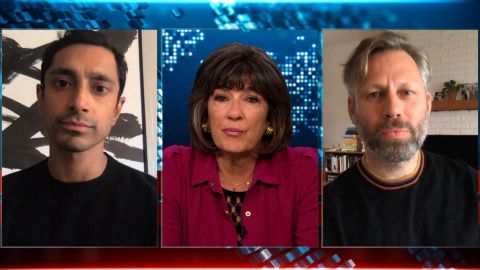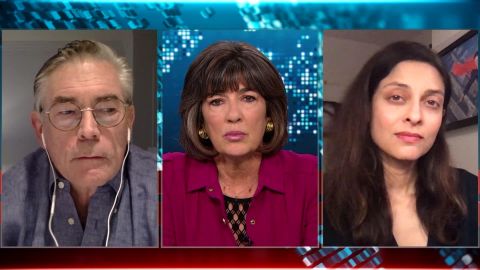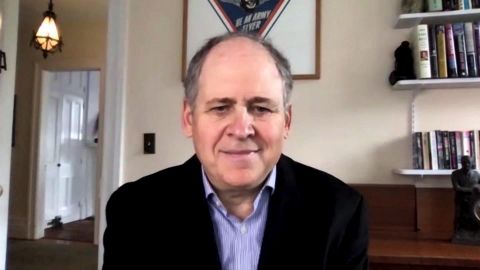Read Transcript EXPAND
CHRISTIANE AMANPOUR: And turning now to U.S. politics and a one-term president. Jonathan Alter is an award-winning journalist and author of three bestselling presidential biographies. The latest is called “His Very Best” and it tells the story of Jimmy Carter who was elected in 1976 and then defeated by Ronald Reagan in 1980. Here he is speaking to our Walter Isaacson about why he thinks Carter’s tenure has been grossly underrated.
WALTER ISAACSON: Thank you, Christiane. And, Jonathan Alter, welcome to the show.
JONATHAN ALTER, AUTHOR, “HIS VERY BEST”: Thanks for having me on, Walter.
ISAACSON: All of your books, whether they be about Obama or Franklin Roosevelt are about character as is this one about Jimmy Carter. Tell us why that’s so important right now as we come out of the age of Trump.
ALTER: Well, I mean, you know, I think if you were to summarize in civil terms what’s been so terrible about the Trump presidency is that he’s a person of poor character pretty much across the board. He really doesn’t have any positive character attributes that I can think of off the top of my head. Now, Jimmy Carter, by contrast, was as flawed individual like all people, and he, you know, arguably was a political failure as president, but I argue not only was he a substantive success but his character is a model for us moving forward, his core decency, honesty, accountability, compassion can help light our way to a better place.
ISAACSON: He had a certain humility that comes out in the book and yet, he was able to combine humility with ambition. Explain that to us.
ALTER: So, I actually don’t believe there’s any such thing as a humble politician. I think it’s a contradiction in terms. But Jimmy Carter and his wife, Rosalynn, who he has known for 93 years since just after she was born and Lillian Carter, Jimmy’s mother was a nurse and delivered Rosalynn in a small town of Plains, Georgia, that they both lived. The two of them are — they — I guess they epitomize a sense of character and commitment in what they do pretty much across the board. And so, they live — just to take one dimension that does relate to humility. They live remarkably modest lives. I learn that until, you know, the last couple of years when he’s had some health challenges as she has, and they are in their mid-90s now, Jimmy Carter mowed the grass at their church, Rosalynn would be vacuuming the sanctuary, and I — you know, I had these, you know, meals with them on paper plates in their community. So, there’s a real modesty there that arguably he took too far when he was president and he — Gerry Rafshoon, one of his top aides, said that he made the mistake of de-pomping (ph) the presidency. For instance, he ordered that “Hail to the Chief” not be played when he came in the room. A couple of years into his presidency they felt — his aides felt like he had taken it too far and they restored the playing of “Hail to the Chief” but, you know, he sold the Sequoia, the yacht that presidents had used and that hurt him because it made it harder for him to lean on members of Congress by taking them out on a yacht. That was his idea of hell, to be trapped on a yacht with congressmen, and that tells you a little bit about something like what he’s really like. He’s not a warm and fuzzy guy in person.
ISAACSON: How would you compare him to Joe Biden?
ALTER: So, it’s interesting. Politically, there’s some I think compelling comparisons right now because Biden ran a campaign very similar to the one that Jimmy Carter ran after Watergate in 1976. It was about restoring integrity to the presidency. They both used that word healing and Biden saw something in Carter very early. He was the first member of the Senate to endorse Carter. But in terms of their temperament they are quite different. So, I compare Biden in this respect to Franklin Roosevelt in that Roosevelt was described as having a second-class intellect and a first-class temperament, but Jimmy Carter was kind of the reverse of that. First-class intellect, one of the smartest people ever to be president of the United States, enormously complicated which kept me interested and I hope keeps keeps readers interested, he’s layered, there’s many, many dimensions to him. And yet, maybe, arguably second-class temperament in terms of connecting to other people, maintaining his relationships within the Democratic Party which he did not do and he considered that, he told me that that was his biggest regret in the presidency.
ISAACSON: When I was growing up in the south the populous movement had two paths they could take. You could either play the race card and become like a George Wallace or you could be a populous like Huey Long was in Louisiana or for that matter, a Bill Clinton was and be a populous that tried to heal the divide of race. In your book on Jimmy Carter, I found it somewhat surprising that initially he was what we would now say is on the wrong side of the race issue.
ALTER: Yes. I think that’s true. He was never an explicit racist. His whole life, there’s no sign of racism on Jimmy Carter’s part. But he ran in 1970 because he needed that rural vote, he ran a code word campaign and even paid a visit to the founder of the white citizens council in Georgia just before the election to send a signal that, you know, he was with them. But then something really interesting happened. He — through the efforts of somebody who introduced him to Daddy King who became an important ally, even though Carter have never bothered to meet Martin Luther King Jr., Carter on his first — in his first moment as governor, literally minutes after he was sworn in, said the time for racial discrimination is over, and all of these rural segregationists, they felt he had betrayed them. Some of them even walked out of his inauguration, and the African-Americans in attendance looked at each other and said, he said what? They could not believe that he said this. It doesn’t sound like anything now but in Georgia in 1971 it was a big move. He lands on the cover of your old magazine, “Time” magazine as the face of the new south, and he runs a very progressive administration in Georgia and then in Washington, very progressive on race. And now, in Africa, they name children after Jimmy Carter because he’s done so much for Africa and — but what he said after George Floyd, I thought was very interesting, he said, you know, Rosalynn and I have learned over our lifetimes that silence equals violence, and they were silent too long because in the community they were living in, if they had spoken up, they possibly would have had their business dynamited, which is what happened to one of his rivals in business. So, he was in an environment of white terrorism. And so, he kind of ducked the civil rights movement and then exploit it had a little bit in that 1970 campaign. So, he spent the second half of his life essentially making up for what he didn’t do in the first half. And I argue that all of his amazing good deeds in the post-presidency and much of what he did that was very important, human rights while he was president, this is a form of atonement. It’s driven partly by his faith but partly by his sense of wanting to do better.
ISAACSON: Why does Jimmy Carter have the reputation of being a weak and unaccomplished president?
ALTER: So, I think he’s seen as weak, which he considers to be the biggest misperception of him, and I think he’s quite right about that. So, two things happened. First, the Republicans in 1980 did a very effective job of making it seem like he was weak on defense. He had raised defense spending by 5 percent, which is a lot. He had built the B-2 bomber that helped win the Cold War. He had, you know, used soft power with this human rights policy to hollow out the Soviet Union, a number of conservatives, including Larry Eagleburger who became secretary of state, and Bob Gates, they credited Carter with helping to win Cold War with his human rights policy. But at the time they were saying, he’s weak, he’s weak, he’s weak. Mostly because he would not bomb Iran. He didn’t want — he thought it would get the hostages killed. And then when he let himself get held hostage essentially by the Ayatollah, that created a perception of weakness that he was not able to get around. He did not do a good job of handling that whole situation, not because he was wrong in not bombing Iran, that would have been disastrous, but because he had some bad luck with the Iran hostage rescue mission and also, he was unimaginative and he let them hold these cards. He paid too much attention to the hostages. And remember, “Nightline” was originally called “America Held Hostage.” So, that’s going to create an impression of weakness. But when you actually look at him and talk to people who know him, they all talk about how tough that he is. And he could be a real S.O.B. And, you know, when he was in Georgia, they called him Jungle Jimmy because he had such sharp elbows, and I don’t think anybody was ever on the receiving end of those icy blue eyes and that tight smile when he was — that he used when he was mad at you would ever say he was in the slightest bit weak. But in American politics, if you put peace — if you prioritize peace, whether you’re a president or a former president, there are always going to be people who call you weak, and Jimmy Carter always put peace first. I mean, he’s close to being a pacifist in seeing war as the last option. This empowered him to be a really effective diplomat, not just at Camp David and establishing full diplomatic relations with China, which is now the foundation of a global economy. That was a product of Carter’s diplomacy, the Panama Canal Treaties, which prevented a war in Latin America, but every time you go for a treaty or peace or improve relations, you risk being labeled weak by hawkish opponents, even if you’ve, you know, put theater nuclear weapons in Europe, which Carter, not Reagan did.
ISAACSON: A lot of Americans, when they think of the Carter presidency, they think of very long gas lines, they think of inflation, they think of hostages in Iran. Is he responsible for all of those things that are the most memorable parts of his years (ph)?
ALTER: Actually, no. He was swamped by events in 1979 and ’80, and you mentioned them. But he was not responsible for those gas lines. You know, the oil prices had increased 14-fold, not 14 percent, 14-fold in the prior decade. You know, so, coming out of the 1973 oil embargo, this not only, you know, eventually led indirectly to those gas lines but also to the rampant inflation that Carter experienced. And what he did was he appointed Paul Volcker to be chair of the Fed, and Volcker jacked up interest rates, over 15 percent. Can you imagine it being a general election campaign when interest rates are over 15 percent? That’s not even mentioning inflation and unemployment. And — but Volcker’s harsh medicine worked. It’s just that Reagan got the credit for it. As far as the hostages being seized, that you could say was his fault in this respect. So, Carter knew — his instinct told him not to let the deposed Shah of Iran into the United States. And Kissinger, the Rockefellers, every — the whole establishment is pushing him, pushing him. Let him in. Let him in. He was our big ally. And Carter at one point says, F the shot. You wouldn’t imagine Jimmy Carter saying that. Like I talked to Harold Brown, the late defense secretary, and he said, yes, I was rather surprised to hear President Carter stay about the Shah. So, his instinct is telling him, said don’t do this. Then the Shah gets sick and the Rockefeller effort, they pull the wool over Carter’s eyes and they send this phony medical report to the State Department that the Shah cannot be treated for his cancer in Mexico, which was completely untrue. And so, Carter, on a humanitarian basis, makes the worst decision of his presidency, and he lets the Shah into New York Hospital to be treated. He’s only in the United States for a short time, but he lets him come in. And just days later, these radical students in Tehran seized the hostages at the U.S. embassy and that, you know, did as much anything to wreck his presidency.
ISAACSON: As you say, we most remember Carter now for the post-presidency. Is that a bit overrated or has it been an important redefinition of his presidency?
ALTER: Well, it’s both. So, Jimmy Carter revolutionized three things. He revolutionized the vice presidency. He was the first president to ever give his vice president, Walter Mondale, any responsibility, put him in the military chain of command, give him an office in the West Wing and many other things. He revolutionized the role of first lady. Rosalynn Carter was the most influential and powerful first lady in American history at that time, much more influential than, say, Eleanor Roosevelt. And then, after he left office, he revolutionized the post-presidency, very inspiring work that he has done. Not so much building houses, because he doesn’t actually run habitat for humanity. He does that one week a year, but he’s nearly eradicated any worm disease which afflicted 3 million people in Africa and Latin America, and monitored all these elections. Done these very inspiring important things on human rights and peacekeeping. Prevented wars in 1984 and Haiti and North Korea. Convinced Daniel Ortega to leave voluntarily, which was the only time a communist leader has ever done so. The main reason I think it’s a little overrated and I don’t devote as much attention to it in the book nearly as much as I do to his presidency is that when you’re not president anymore, you don’t really have any power anymore, and we forgot how many levers of power you actually have when you’re president. So, he got much more accomplished as president than as a former president. And I think there’s kind of a happy lesson for us. After January 20th, you know, Donald Trump will have his Twitter account. Maybe it will get smart and cancel his account, but he’ll probably still have that and he’ll be able to, you know, make noise, but he won’t have any power. And so, it will be like, you know, Macy’s Day balloon, you know, you’ll see that power hissing out of him. And so, that’s why I think his post-presidency has been overrated. And also, I just kind of — you know, I wanted to — and I think I did convince people of that this sort of easy- minded shorthand no good as president, great afterwards, just didn’t bear scrutiny.
ISAACSON: Jonathan Alter, thanks for being with us.
ALTER: Thanks, Walter.
About This Episode EXPAND
Christiane speaks with Donald G. McNeil and Devi Sridhar about Britain’s approach to the COVID-19 vaccine. She also speaks with Riz Ahmen and Darius Marder about their new film “Sound of Metal.” Walter Isaacson speaks with Jonathan Alter about his new biography of Jimmy Carter.
LEARN MORE


